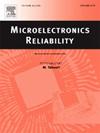Reliability assurance in foldable displays: Design of experiment-based testing strategy for market-ready products
IF 1.6
4区 工程技术
Q3 ENGINEERING, ELECTRICAL & ELECTRONIC
引用次数: 0
Abstract
Foldable displays have many moving parts and can operate in different environments. These conditions lead to potential interactions between diverse failure mechanisms and stresses, making reliability assurance a major challenge. Ensuring reliability while considering all these potential failure mechanisms and stresses is very challenging. This paper introduces a method for efficiently evaluating the reliability and lifespan of foldable displays. First, potential failure modes associated with foldable displays were identified, and corresponding influencing factors were determined. In addition to the fundamental stress factor of repetitive folding, temperatures, humidity, and temperature changes were chosen as influencing factors. To assess the influence of these factors on the display performance, two levels of stress severity were selected. Using these three factors and two stress levels, experiments were conducted using the design of experiments (DOE) method. The test results intuitively revealed the principal effects of each stress factor on the final quality and performance of the display. We found that low temperatures and temperature changes can affect the catastrophic failure of the display panel, and the number of folds impacts the degradation of the hinge parts. The proposed DOE-based evaluation method provides an efficient and economical approach for assessing the reliability of foldable displays.
可折叠显示器的可靠性保证:面向市场产品的基于实验的测试策略设计
可折叠显示器有许多可移动的部件,可以在不同的环境中使用。这些条件导致各种失效机制和应力之间的潜在相互作用,使可靠性保证成为一项重大挑战。在考虑所有这些潜在的失效机制和应力的同时确保可靠性是非常具有挑战性的。本文介绍了一种有效评估可折叠显示器可靠性和寿命的方法。首先,识别与可折叠显示器相关的潜在失效模式,并确定相应的影响因素。除了重复折叠的基本应力因子外,还选择了温度、湿度和温度变化作为影响因素。为了评估这些因素对显示性能的影响,我们选择了两种应激严重程度。利用这三个因素和两个应力水平,采用试验设计法(DOE)进行了试验。测试结果直观地揭示了各应力因素对显示器最终质量和性能的主要影响。我们发现低温和温度变化会影响显示面板的灾难性失效,折叠次数会影响铰链部件的退化。该方法为可折叠显示器的可靠性评估提供了一种高效、经济的方法。
本文章由计算机程序翻译,如有差异,请以英文原文为准。
求助全文
约1分钟内获得全文
求助全文
来源期刊

Microelectronics Reliability
工程技术-工程:电子与电气
CiteScore
3.30
自引率
12.50%
发文量
342
审稿时长
68 days
期刊介绍:
Microelectronics Reliability, is dedicated to disseminating the latest research results and related information on the reliability of microelectronic devices, circuits and systems, from materials, process and manufacturing, to design, testing and operation. The coverage of the journal includes the following topics: measurement, understanding and analysis; evaluation and prediction; modelling and simulation; methodologies and mitigation. Papers which combine reliability with other important areas of microelectronics engineering, such as design, fabrication, integration, testing, and field operation will also be welcome, and practical papers reporting case studies in the field and specific application domains are particularly encouraged.
Most accepted papers will be published as Research Papers, describing significant advances and completed work. Papers reviewing important developing topics of general interest may be accepted for publication as Review Papers. Urgent communications of a more preliminary nature and short reports on completed practical work of current interest may be considered for publication as Research Notes. All contributions are subject to peer review by leading experts in the field.
 求助内容:
求助内容: 应助结果提醒方式:
应助结果提醒方式:


